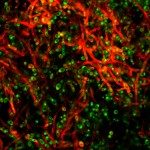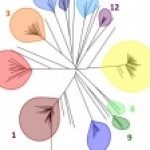Lien vers Pubmed [PMID] – 24286230
Mol. Microbiol. 2014 Feb;91(3):452-71
In response to genotoxic stress (GS), Candida albicans can undergo polarized growth and massive genome rearrangements including loss-of-heterozygosity (LOH) events. We evaluated the contribution of the CaRad53p and CaDun1p kinases of the DNA damage checkpoint (DDCP) in these processes. Characterization of C. albicans rad53ΔΔ and dun1ΔΔ mutants revealed that the two kinases were involved in the maintenance of heterozygosity. SNP-RFLP typing and whole-genome sequencing of rad53ΔΔ isolates having undergone a LOH revealed that, according to the chromosome on which LOH had occurred, these were predominantly due to break-induced replication/mitotic cross-over or chromosome loss. Loss of CaRAD53 also resulted in frequent aneuploidies. Deletion of CaDUN1 led to an increase in recombination-dependent LOH but did not trigger aneuploidies. It also increased GS sensitivity but did not impair GS-induced polarized growth contrary to CaRAD53 deletion. Characterization of CaRad53p site-directed mutants demonstrated that its kinase activity and N-terminal phosphorylation sites were crucial for its function in the resistance to GS, maintenance of heterozygosity, cell cycle regulation and polarized growth. Moreover, using phosphomimic mutants, we revealed an uncoupling of the functions of CaRad53p in these different processes, thus providing a novel understanding of how the DDCP may regulate downstream events in response to GS.





